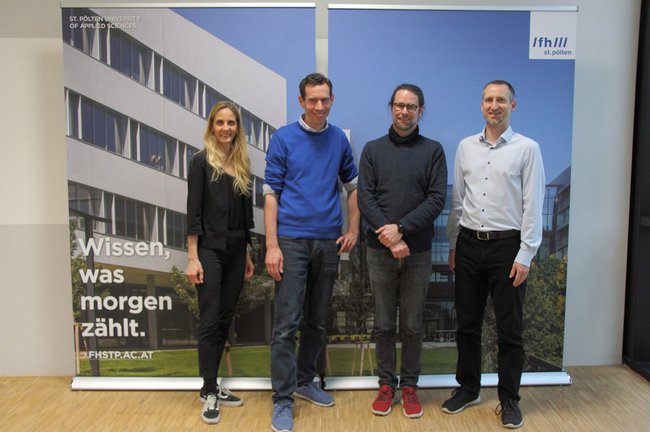Digital Product Passports for Greener Economy
A Report on the i2s Future Lab at the St. Pölten UAS

Digital applications and tools have the power to support the transition towards a sustainable economic and social system that builds on the principle of circular economy. One important instrument on this path is the so-called Digital Product Passport (DPP).
Within the framework of the third i2s Future Lab at the St. Pölten University of Applied Sciences, experts from various industries discussed the status quo, requirements, and challenges arising from a DPP, particularly for small and medium-sized enterprises.
“Digital Twin“ of Products
The European Commission defines a “Product Pass” as a set of data that electronically registers and processes product-related information and exchanges it between companies in the supply chain, authorities, and consumers – a “digital twin”, as it were. Its purpose is to extend the product lifecycle, reduce the consumption of resources, and support consumers in their investment and consumption decisions.
As of 2026, the first Product Passports are to be introduced starting with the product groups electronics and batteries, and later extended to other groups such as food, fashion, building and construction materials, and packing.
Litmus Test for Digitalisation and Sustainability
The focus of the i2s Future Lab was on the potential, opportunities, and challenges of a DPP for the sustainability transition from the perspectives of the supply chain and the manufacturing of products and services requiring documentation on the one hand, and the expected benefit for consumers on the other.
“The Digital Product Passport is a core EU project in the sustainable transformation towards a circular economy and the strengthening of consumer rights. It is a litmus test that will show whether the digitalisation can contribute to making our economic system more equitable and ecological”, explains Tassilo Pellegrini, organiser of the i2s Future Lab and co-head of the Institute for Innovation Systems at the St. Pölten UAS.
“Waste Is Valuable Material in the Wrong Place”
In the discussion panel, experts talked about aspects of sustainable economy and potentials of the Digital Product Passport in this respect. “The Digital Product Passport has a lot of potential when it comes to B2C and B2B. Key questions are ‘Where does the packaging of my product come from?’ or ‘How sustainable is my production?’”, says event moderator and UAS lecturer Christian Baczynski from the viesure innovation center, thus inspiring the participants to reflect on the topic.
“Waste is valuable material in the wrong place! By describing what a product contains, Product Passports help to remove harmful substances more effectively and – even more importantly – recycle more valuable materials or entire components. Some steps in the right direction have already been taken but I think there is much room for improvement yet”, says Felix Badura, CEO of Digi-Cycle GmbH.
i2s Future Lab
The i2s Future Lab of the Institute for Innovation Systems (i2s) at the St. Pölten UAS is a networking and discussion platform for experts and opinion leaders at the interface of greening and digitalisation. The event is held in collaboration with the Digital Innovation Hub (DIH) Work which receives funding from the Federal Ministry of Labour and Economy (BMAW) within the framework of the programme “Digital Innovation Hub in Austria”.
i2s Future Lab "Digital Product Passport – Successful Transition towards More Sustainability through Efficient Data Use?”, 11/05/2023
Research Project on the Topic
In the research project “DPP4ALL”, the Institute for Innovation Systems of the St. Pölten UAS examines the technical, legal, and organisational requirements for such a Digital Product Passport. Project partner is Brainbows GmbH. The project is funded by the Federal Ministry for Climate Action, Environment, Energy, Mobility, Innovation and Technology (BMK).

FH-Prof. Mag. Dr. Tassilo Pellegrini
Head of Research InstituteInstitute for Innovation Systems Department of Digital Business and Innovation

Mag. Dr. Susanne Roiser , MA
Head of Department Head of Research InstituteInstitute for Innovation Systems Deputy Academic Director Digital Management and Sustainability (MA) Department of Digital Business and Innovation
